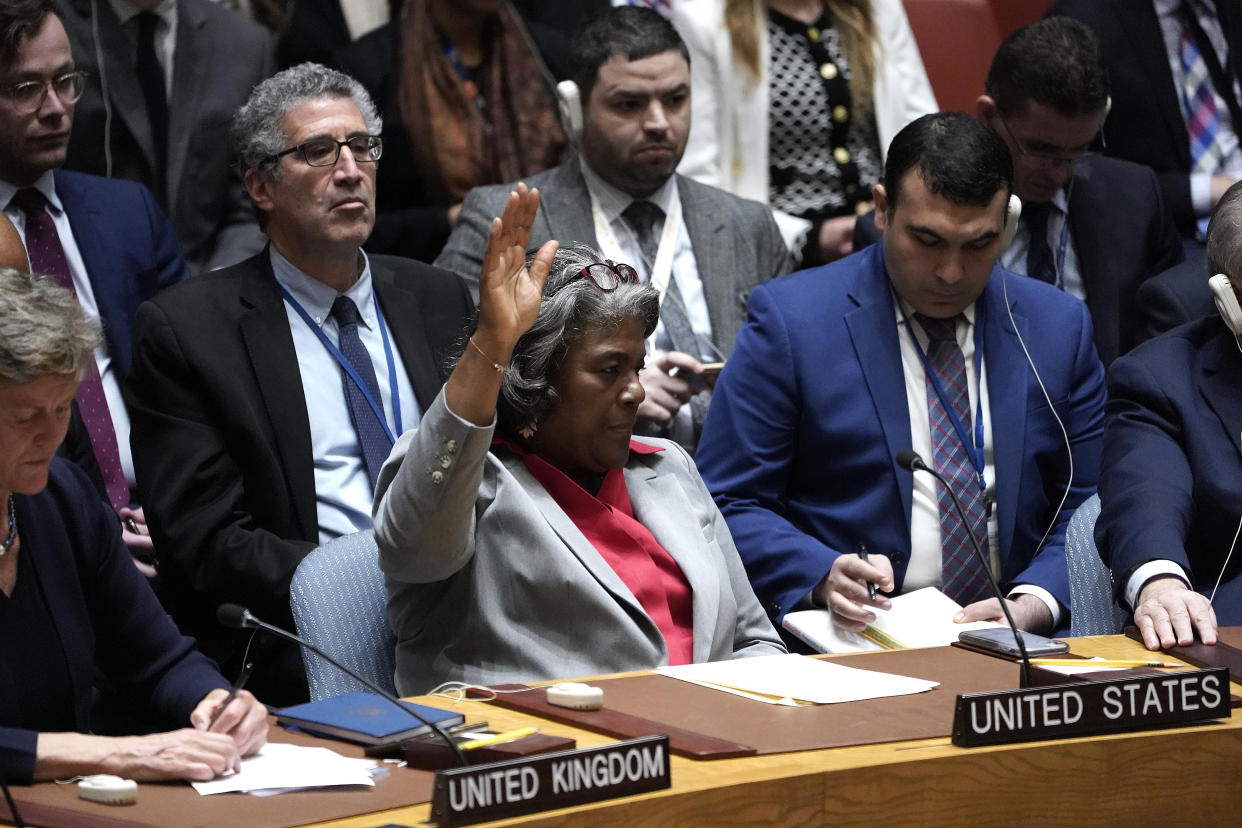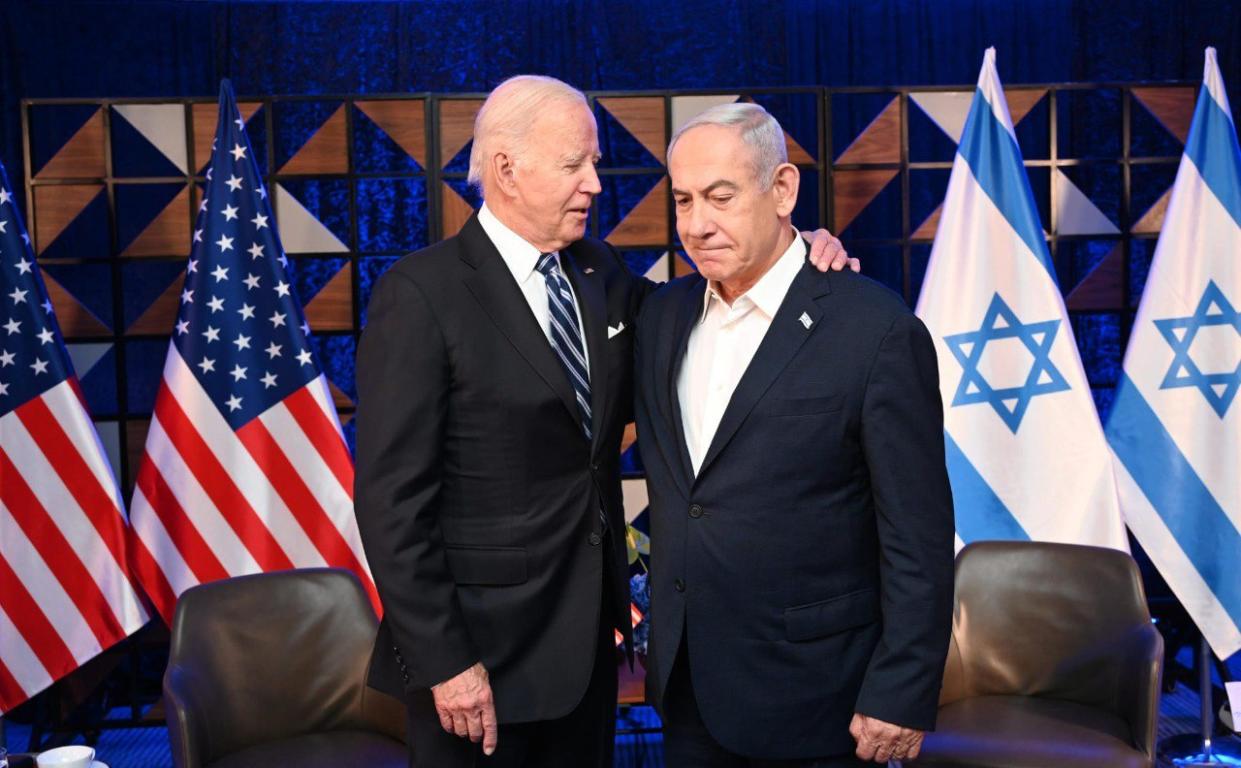Israeli Prime Minister Netanyahu cancels delegation after U.S. abstains from U.N. ceasefire vote. Here's the latest.
Israeli Prime Minister Benjamin Netanyahu on Monday canceled sending an Israeli delegation to Washington, D.C., that was scheduled to arrive this week after the U.S. abstained from voting on a United Nations Security Council resolution calling for an immediate ceasefire between Israel and Hamas in Gaza.
"In light of the change in the American position, Prime Minister Netanyahu decided the delegation would not leave," a statement from Netanyahu's office said, adding that the failure to block the proposal was a "clear retreat" from its previous position.
The U.N. Security Council had earlier approved a resolution calling for an immediate ceasefire between Israel and Hamas in Gaza, the first time it has made such a demand since the war began.
Fourteen of 15 countries voted in favor of the ceasefire resolution, which called for a halt to fighting in Gaza for the month of Ramadan. The United States abstained from voting.
The Security Council had failed on Friday to adopt a similar resolution drafted by the United States, with Algeria, China and Russia voting against the measure.
🇺🇸 The response from the U.S.

Linda Thomas-Greenfield, the U.S. ambassador to the United Nations, said Monday that she welcomed the “support of the ongoing diplomatic efforts led by the United States, Qatar, Egypt, to bring about an immediate and sustainable ceasefire, secure the immediate release of all hostages and help alleviate the tremendous suffering of Palestinian in Gaza who are in dire need of protection and life-saving humanitarian assistance.”
“The United States fully supports these critical objectives,” she added. “In fact, they were the foundation of the resolution we put forward last week.”
At the White House, National Security Council spokesman John Kirby said that because the final text of the resolution approved Monday did not include language condemning Hamas, the United States did not vote in favor.
🇺🇳 How we got here

Last week, the U.S. ended decades of stalwart support for Israel by submitting a draft resolution calling for an immediate ceasefire in the war without linking it to the release of hostages held in Gaza by Hamas.
The U.S. had voted against three previous ceasefire resolutions, saying that calling for an immediate end to military hostilities would imperil hostage negotiations.
“We are getting closer to a deal for a ceasefire with the release of all hostages but we aren’t there yet,” Thomas-Greenfield said Monday. “Now let’s be clear: A ceasefire could’ve come about months ago if Hamas had been willing to release hostages. Months ago.”
Since 1945, the U.S. has vetoed dozens of Security Council resolutions designed to force the Jewish state to make concessions to the Palestinians.
But Kirby bristled at the notion that the recent moves by the U.S. on the Security Council represent a change in policy.
"Our vote does not I repeat does not repressent a shift in our policy. We've been very clear, we've been very consistent in our support for a ceasefire as part of a hostage deal," he said, adding: "Of course we still have Israel's back."
▶️ Mounting calls for a ceasefire in Gaza

The U.S. has been facing mounting calls to put pressure on Israel to change course. More than 30,000 Palestinians have been killed in Gaza as a result of the Israeli government’s military campaign responding to the Oct. 7 attack by Hamas that left nearly 1,200 dead in Israel.
Israel has largely ignored those calls, recently announcing plans to attack Rafah, a city in southern Gaza where it initially directed Palestinians to flee to as it conducted operations in the northern part of the territory.
The U.S. strongly opposed the idea, and global aid organizations have declared that the residents of Gaza are on the brink of famine.
“A major military operation in Rafah would be a mistake, something we don’t support," Secretary of State Antony Blinken said last week.
Last week, Senate Majority Leader Chuck Schumer delivered a blistering speech on the Senate floor describing Netanyahu as an obstacle to peace and calling for new Israeli elections.
Biden praised the speech, further angering Netanyahu, who addressed congressional Republicans on Wednesday to denounce it.
🔎 What will a ceasefire resolution actually accomplish?

That’s unclear. The resolution drafted by the U.S. last week was meant to send a very public message to Netanyahu’s government that it opposes the way Israel is conducting the war in Gaza. With the U.S. abstaining from Monday’s vote, the message is less clear.
In U.S. politics, Biden’s embrace of Israel following the Oct. 7 Hamas attacks was too one-sided for many Democrats in that it ignored decades of Palestinian suffering in Gaza.
In Michigan’s presidential primary, many Democrats protested Biden’s handling of the war, with 13% casting a vote for “uncommitted.” Michigan has the largest Arab American population of any state, but younger voters have expressed their displeasure with Biden over U.S. support for Israel across the country.
The Wall Street Journal’s conservative editorial board last week suggested that Democrats in Washington had turned on Israel to win over those disgruntled voters.
The number of voters disgruntled with Israel’s military operation in Gaza is clearly growing. A February poll of U.S. adults conducted by the Associated Press-NORC Center for Public Affairs Research found that 50% believe that Israel’s offensive has gone too far. In November, that number was 40%.


